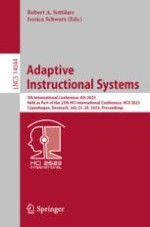2023 | OriginalPaper | Buchkapitel
Identifying Individual Differences that Predict Usage of an Adaptive Training System in a United States Marine Corps Course
verfasst von : Nicholas W. Fraulini, Matthew D. Marraffino, Allison E. Garibaldi
Erschienen in: Adaptive Instructional Systems
Verlag: Springer Nature Switzerland
Aktivieren Sie unsere intelligente Suche, um passende Fachinhalte oder Patente zu finden.
Wählen Sie Textabschnitte aus um mit Künstlicher Intelligenz passenden Patente zu finden. powered by
Markieren Sie Textabschnitte, um KI-gestützt weitere passende Inhalte zu finden. powered by
